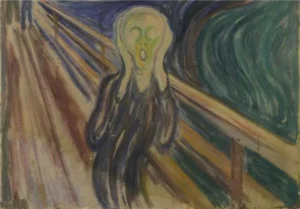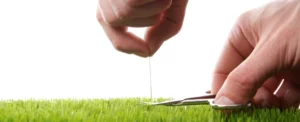
My son Izaak has been living in Australia for several years now. One Australian phrase that I love is “No Worries, Mate!” I remember waiting in a huge line to check in for a flight there in 2002. Over the loudspeaker they announced “No worries, everyone! Relax!” Can you imagine that announcement in an American airport, with all of its dire warnings about yellow or orange alerts? I hope Australia can hold on to that feeling.
“No Worries” is especially comforting to me because I’ve struggled with disaster thinking my entire life. When I let my mind do its normal meandering, I often find it concocting the most horrific and worrisome scenarios. It probably began in childhood, when I would sit in bed and plan out how I’d escape down a gutter outside my bedroom window if the house caught on fire. My worrisome ways were likely fueled by an isolated and difficult childhood punctuated by occasional violence and frequent family deaths. I often wonder how I came out of it all with an inherently cheerful, optimistic, and determined personality. Or maybe my childhood actually fostered this resilience.
Nevertheless, my habitual tendency toward disaster thinking remains. I worry unnecessarily about my kids, upcoming travel (which I simultaneously look forward to), and more. I’m an expert at concocting the worst possible scenarios. As a Jew, I can always fall back onto thoughts about concentration camps or other forms of torture. And when I get any kind of health worry — even a cut on my finger — the medical knowledge I possess enables my mind to inevitably worm its way to death: what if I get MRSA?!
Of course, I’m not alone. Today, everyone’s tendency toward disaster thinking has been exacerbated by the ever present media that informs and alarms us about every possible health woe and worry, let alone the ubiquitous political media constantly washing over us.
Luckily, I’ve become increasingly aware of these kinds of thoughts. They are much less subconscious than they used to be. For example, I’m now able to laugh at my ability to convert any health woe into a death sentence — thanks to my husband who reminds me and laughs with me. That usually stops those kinds of thoughts in their tracks.
Recently, I have begun attending services at a nearby Center for Spiritual Living. The community follows the spiritual science message of teachers like Neville Goddard and Ernest Holmes, who emphasized how our thoughts create our reality. And so I’ve begun to work even more diligently on my disaster thinking tendencies. (Luckily, my life has actually been wonderful and quite luck-filled, despite my worries — perhaps thanks to my innately optimistic nature!)
One thing that I’ve learned is that constant worrying and fretting has no purpose. We may think it prepares us for the future, but any required thought-preparations really take much less time than we spend on worrying. Write down your ideas or preparations and then put them aside. Remember that worry and fretting just helps negative outcomes to manifest! (I also discuss this point in my book Active Consciousness). It also inhibits positive action or response, fosters unhappiness within you and those around you, and even contributes to physical disease.
For four years before my mom died in 2010, she experienced increasingly poor health and I knew she could die unexpectedly. I often found myself thinking “What would I do if Mom died tomorrow?” and would plan out the scenario in my mind. A good friend gave me some excellent advice: “Your mom will only die once. But you’re living her death a thousand times!” The moral of this story is this: Have confidence that when the time comes, you will respond to any crisis in the best way you can. Nothing more is required.
Here are some more tips I’ve tried to put into practice:
 | When you notice a thought you’d like to stop dwelling on, say out loud: STOP! (You’ll be surprised how well this works.) |
 | Replace your worry by imagining the BEST possible scenario or outcome. |
 | Focus your mind on the good in your life with gratitude. |
I hope this is useful and hopeful information for all of you. We live in a time of great trepidation about the future. But constantly “freaking out” — a state many people are caught in — serves no one and likely makes things worse.
I know I’ve written this message before. But it may be the most important message for our times. Remember that the world can turn on a dime. Small things — including small positive things you do in your own life — can ripple out in unexpected ways and cause huge changes. Anything can happen.
As we enter spring and the flowers and plants emerge from the Earth, use your consciousness to help good things to happen! Your thoughts and beliefs are the seeds of our collective future.



